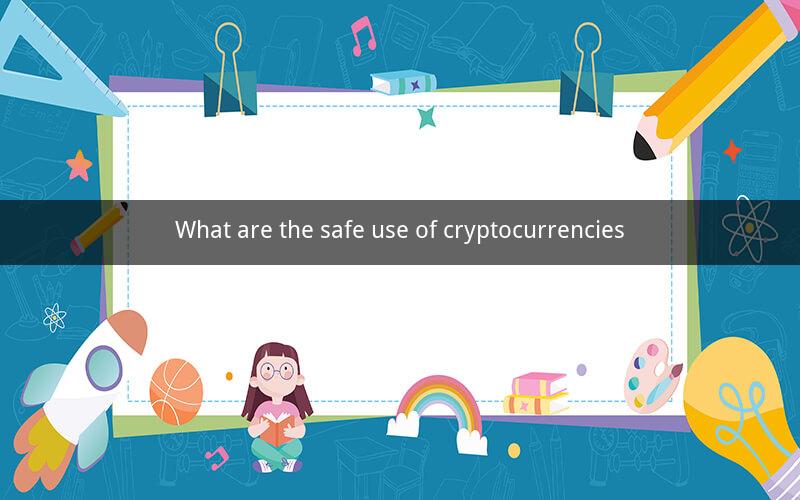
Directory
1. Introduction to Cryptocurrencies
2. Understanding the Risks
3. Best Practices for Safe Use
3.1. Secure Wallets
3.2. Two-Factor Authentication
3.3. Regular Updates and Security Checks
3.4. Caution with Exchanges
3.5. Avoiding Scams
4. Legal and Regulatory Considerations
5. Long-Term Storage Solutions
6. Conclusion
Introduction to Cryptocurrencies
Cryptocurrencies have revolutionized the way we think about money and transactions. They offer a decentralized, digital alternative to traditional banking systems. However, with this innovation comes a set of risks and challenges that users must navigate carefully. This article delves into the safe use of cryptocurrencies, providing insights and best practices to ensure a secure and responsible engagement with this emerging financial landscape.
Understanding the Risks
Before delving into safe practices, it's crucial to understand the risks associated with cryptocurrencies. These include:
- Market Volatility: Cryptocurrencies can experience rapid and extreme price fluctuations.
- Security Threats: Hackers and cybercriminals often target cryptocurrency wallets and exchanges.
- Lack of Regulation: The absence of a centralized regulatory authority can lead to inconsistencies and vulnerabilities.
- Scams and Fraud: The cryptocurrency market is prone to fraudulent activities, including Ponzi schemes and phishing attacks.
Best Practices for Safe Use
3.1. Secure Wallets
The choice of wallet is paramount in ensuring the safe storage of cryptocurrencies. Here are some key considerations:
- Cold Storage: Use hardware wallets for storing large amounts of cryptocurrencies. These wallets are offline, reducing the risk of hacking.
- Mobile and Desktop Wallets: For smaller amounts, consider mobile or desktop wallets. Ensure they are from reputable sources and keep them updated.
- Backup: Regularly backup your wallets to prevent loss due to hardware failure or theft.
3.2. Two-Factor Authentication
Adding an extra layer of security can significantly reduce the risk of unauthorized access:
- Enable 2FA: Use two-factor authentication on all accounts, including exchanges and wallets.
- Backup Codes: Keep backup codes safe and accessible only to you.
3.3. Regular Updates and Security Checks
Stay vigilant about the security of your digital assets:
- Update Software: Regularly update your operating system and software to patch vulnerabilities.
- Security Checks: Conduct regular security checks on your devices and accounts.
3.4. Caution with Exchanges
Exchanges are platforms where you can buy, sell, and trade cryptocurrencies. Here's how to use them safely:
- Research: Choose reputable exchanges with good reviews and a solid track record.
- Limit Exposure: Avoid keeping large amounts of cryptocurrencies on exchanges for extended periods.
- Security Features: Look for exchanges that offer advanced security features like cold storage and insurance.
3.5. Avoiding Scams
Scammers often target cryptocurrency users. Here's how to protect yourself:
- Verify Sources: Always verify the legitimacy of websites, emails, and messages.
- Educate Yourself: Stay informed about common scams and their red flags.
- Be Skeptical: Be wary of offers that seem too good to be true.
Legal and Regulatory Considerations
Understanding the legal and regulatory framework in your jurisdiction is essential. Here are some points to consider:
- Tax Implications: Cryptocurrency transactions are often taxable. Consult with a tax professional.
- Compliance: Ensure your activities comply with local laws and regulations.
- Reporting: Be prepared to report your cryptocurrency transactions to relevant authorities if required.
Long-Term Storage Solutions
For long-term storage, consider the following:
- Hodl Strategy: Holding cryptocurrencies for the long term can mitigate the impact of short-term volatility.
- Diversification: Diversify your cryptocurrency portfolio to spread risk.
- Regular Reviews: Periodically review your portfolio to ensure it aligns with your financial goals.
Conclusion
The safe use of cryptocurrencies requires a combination of knowledge, caution, and best practices. By understanding the risks, following secure practices, and staying informed about legal and regulatory requirements, users can navigate the cryptocurrency landscape responsibly and securely.
---
Questions and Answers
1. Q: What is the primary difference between a hot wallet and a cold wallet?
A: A hot wallet is connected to the internet and can be accessed online, while a cold wallet is offline and offers higher security for storing large amounts of cryptocurrencies.
2. Q: How can I protect my cryptocurrency from theft?
A: You can protect your cryptocurrency by using secure wallets, enabling two-factor authentication, keeping your software updated, and being cautious of scams and phishing attempts.
3. Q: Are all cryptocurrencies subject to the same legal regulations?
A: No, legal regulations vary by country and jurisdiction. It's important to understand the specific regulations in your area.
4. Q: What should I do if I suspect my cryptocurrency wallet has been hacked?
A: Immediately change your passwords, enable two-factor authentication, and contact the wallet provider for assistance. Monitor your accounts for unusual activity.
5. Q: Can I use the same password for multiple cryptocurrency accounts?
A: No, using unique passwords for each account is crucial to prevent unauthorized access.
6. Q: How often should I update my cryptocurrency wallet software?
A: Regularly update your software to ensure you have the latest security patches and features. Follow the wallet provider's recommendations.
7. Q: Are there any risks associated with using cryptocurrency exchanges?
A: Yes, exchanges can be targets for hackers and may have security vulnerabilities. Choose reputable exchanges and be cautious with how much you store on exchanges.
8. Q: Can I lose all my cryptocurrency if I lose my wallet?
A: Yes, if you lose your wallet or the private key, you may lose access to your cryptocurrency unless you have backups.
9. Q: What is the best way to store a large amount of cryptocurrency?
A: Use a hardware wallet for large amounts of cryptocurrency, as they are more secure than software wallets. Keep your hardware wallet in a safe and secure location.
10. Q: How can I stay informed about the latest developments in cryptocurrency security?
A: Follow reputable cryptocurrency news websites, join online forums, and attend industry events to stay updated on the latest trends and security practices.